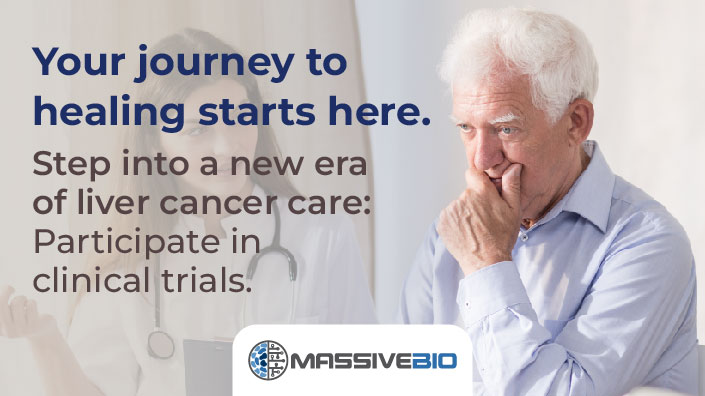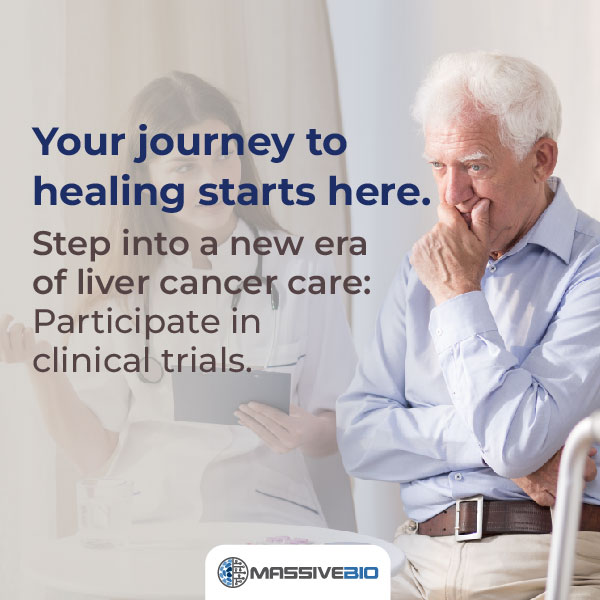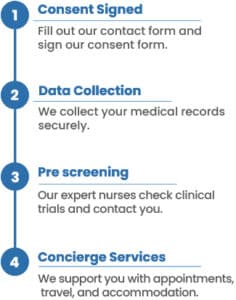News Massive Bio Has Onboarded Over 120,000 Cancer Patients To Find Their Clinical Trial
Liver Cancer Clinical Trial Opportunities
If you have locally advanced or metastatic liver cancer, you should consider joining clinical trials as your best choice.
Compliant with

You can receive a guidebook with information about cancer clinical trials by filling out the form.
Innovative Liver Cancer Treatments
If you are looking for liver cancer treatment options, Massive Bio can assist you. Our advanced artificial intelligence (AI) platform will recommend treatment options through clinical trials tailored to your specific condition. Once you submit your information, our oncology experts will review your advanced liver cancer case and contact you.
Understanding your options is crucial when facing a locally advanced or metastatic liver cancer diagnosis. This cutting-edge advanced liver cancer trials (also known as late-stage liver cancer trial aims to explore new, targeted treatments designed specifically for patients like you – for free.


Are clinical trials a good fit for me?
Clinical trials for liver cancer are important research studies aimed at finding better ways to treat this disease.
These trials give patients a chance to try new treatments for Liver Cancer that are not widely available yet. They offer hope and may have fewer side effects. Joining a clinical trial can be a valuable opportunity to explore innovative therapies for liver cancer. Register for our matching service to find suitable liver cancer clinical trials for free.
Here’s how it works:
Diagnosis: If your doctor has diagnosed you with liver cancer, specifically Hepatocellular Carcinoma (HCC). It can be either locally advanced (stage 3) or metastatic (stage 4). From this point finding a potential breakthrough in treatment is now closer.
Understanding your condition: Hepatocellular carcinoma (HCC) is a type of liver cancer that starts in the liver cells. HCC accounts for about 85-90% of all liver cancer cases globally. It often develops in people with long-term liver diseases, especially those with cirrhosis.
Liver Cancer risk varies globally. The main risk factors are hepatitis B or C infections, heavy alcohol use, and smoking. It is characterized by the malignant growth of liver cells and can be asymptomatic in early stages, making early detection challenging. As a result, most clinical trials are focused on advanced HCC.
What is Advanced Hepatocellular Carcinoma?
Advanced hepatocellular carcinoma (HCC) refers to the either Stage 3 Locally Advanced or Stage 4 Metastatic Liver Cancer (Metastatic Hepatocellular Carcinoma):
- Locally advanced (Stage 3) Liver cancer occurs when tumors are large or have invaded major liver blood vessels. However, they have not yet spread to other parts of the body. Our system provides an opportunity to join a locally advanced liver cancer trial for potential treatment options
- Metastatic (Stage 4) liver cancer is the most advanced. At this stage, the cancer has spread to nearby lymph nodes or distant organs like the lungs or bones.Massive Bio will help you join different metastatic liver cancer trials, providing access to potential new treatment options.
Early-stage HCC (Stage 1 and Stage 2) has higher treatment success rates due to effective options like surgery and local therapies. Early detection leads to better survival rates, but since many diagnoses occur at advanced stages, most clinical trials focus on these later stages where treatment options are limited., aiming to increase Stage 3 and Stage 4 Liver Cancer survival rate.
What is the relevance of the Child-Pugh score in HCC?
The Child-Pugh score helps to assess the severity of chronic liver disease and cirrhosis. This information is crucial for determining the best treatment for liver cancer. It evaluates five factors: bilirubin, albumin, prothrombin time, ascites, and hepatic encephalopathy.
The score helps determine the patient’s prognosis, liver function, and suitability for treatments in HCC management. These five factors give the following staging:
- Class A: Well-compensated disease
- Class B: Significant functional compromise
- Class C: Not compensated disease
Most clinical trials for HCC focus on patients with Child-Pugh A classification due to their well-compensated liver function, allowing for clearer assessment of new therapies, thereby enhancing the reliability of trial outcomes and the development of effective treatments.
Treated vs. Untreated Liver Cancer
- Treated Liver cancer: Includes patients who have received prior treatments (Treatment naive Liver Cancer/Treatment naive Hepatocellular Carcinoma). This group looks at new ways to help people whose cancer has not responded well to standard treatments. Additionally, there are available trials that focus on untreated advanced Liver Cancer.
- Untreated Liver Cancer includes people with liver cancer who have not begun treatment. This applies even if the cancer is advanced or has spread to other parts of the body. This is because researchers want to see how new treatments work from the beginning of care.
Clinical trials are available for people with liver cancer, whether they have received treatment or not. The goal of these trials is to create and evaluate new treatments for advanced liver cancer.
Overview of Hepatocellular Carcinoma Treatment:
Surgery:
- Partial Hepatectomy: Usually for patients with early-stage HCC and preserved liver function. It’s the best option for tumors that can be removed, especially if the patient doesn’t have cirrhosis or has a mild form of liver disease (Child Pugh A)
- Liver Transplantation: Ideal for patients with early-stage HCC (single tumors ≤5 cm or up to 3 nodules each ≤3 cm) who also have cirrhosis or poor liver function. It offers a chance to cure both the cancer and the underlying liver disease.
Ablation Therapies:
- Radiofrequency Ablation (RFA): Involves the use of high-frequency electrical currents to generate heat, which destroys cancer cells. Suitable for patients with early-stage HCC and tumors smaller than 3 cm. An alternative for those who are not surgical candidates.
Embolization Therapies:
- Transarterial Chemoembolization (TACE): Combines chemotherapy with an embolic agent to block blood flow to the tumor.
- Transarterial Radioembolization (TARE): Uses radioactive beads (Yttrium-90) to deliver radiation directly to the tumor.
Systemic Therapies:
- Targeted Therapies: Involves drugs designed to specifically attack cancer cells by interfering with molecules involved in tumor growth and progression, thereby limiting damage to normal cells.
- Immunotherapy: Enhances the body’s immune system to recognize and destroy cancer cells.
Radiation Therapy:
- External Beam Radiation Therapy (EBRT): Is a non-invasive treatment that uses high-energy and high-precision radiation beams to target and destroy cancer cells. Often used in patients with localized disease who are not candidates for surgery or ablation.
Supportive Care focuses on managing symptoms and improving quality of life for patients with advanced HCC or those receiving palliative care. This includes pain management, nutritional support, and psychosocial care.
Resectable vs. Unresectable Hepatocellular Carcinoma (HCC)
- Resectable: Refers to liver cancer that can be surgically removed. Patients with resectable HCC typically have a single tumor or multiple tumors confined to one part of the liver, and their liver function is sufficiently good to tolerate surgery. These patients do not have major vascular invasion or extrahepatic spread (cancer that has spread outside the liver).
- Unresectable: Refers to liver cancer that cannot be surgically removed. Most clinical trials for hepatocellular carcinoma (HCC) focus on unresectable cases due to the limited treatment options and the need for effective therapies, providing an opportunity for patients to join these available trials.
What are the benefits of clinical trials?
- Innovative Therapy: Clinical trial therapies represent the forefront of medical science and technology, tailored specifically to treat various forms of liver cancer (HCC treatment). These advanced treatments are designed for conditions like locally advanced and metastatic liver cancer.
- Personalized Match: We recognize that every patient is unique. That’s why we focus on pairing you with a treatment plan that aligns with your specific requirements and medical history.
- Expert Guidance: Throughout your journey, our experienced team of medical professionals will be by your side, providing guidance, support, and answering any questions you may have regarding your liver cancer treatment.
By joining our matching program, you’re proactively exploring new possibilities and gaining access to an innovative therapy that has the potential to change your life.
We combine the power of technology with our dedicated team of medical providers to find you the best treatment options available.
Access the free matching toolHow Massive Bio Helps Liver Cancer Patients


Massive Bio offers a quick and FREE way to find cancer clinical trials for patients with liver cancer. With our AI-based clinical trial matching system and oncology expert team, we can rapidly match you to liver cancer clinical trials of new therapies for liver cancer.
Talk to us. Our nurses and patient relations coordinators are here and happy to help you. You are not alone in this fight.
Call +1 844 627 7246You are not alone
You can have an experienced team with you
What Are Clinical Trials?
Cancer is an unfortunate reality that touches most of us at some point in our lives. If you or a loved one has cancer, you may have heard or read that clinical trials could offer access to innovative new treatments. But what exactly is a clinical trial?
Dr. Arturo Loaiza-Bonilla from Massive Bio explains how clinical trials function. He discusses the process of joining a clinical trial and the potential benefits for cancer patients.
We dream of the day when cancer disappears from our lives. Massive Bio is working tirelessly on achieving that goal.
-
Why should I trust Massive Bio?
Why should I trust Massive Bio?
Massive Bio has provided health to more than 120,000 cancer patients in 25 countries across three continents. It collaborates with over 80 global partners. In 2022, Massive Bio became part of the Precision Cancer Consortium (PCC), alongside major companies such as AstraZeneca, Bayer, Eli Lilly & Company, GSK, Johnson & Johnson/Janssen, Novartis and Roche.
-
What is the process?
What is the process?
To find the best clinical research studies for you, we need your medical history and consent. You can provide this consent by filling out the form on this page and the following pages. Once you’ve done that, our patient relations coordinator will contact you to discuss the details and provide further information for clinical research matching report.
-
Why do I have to provide my medical records to enroll in a clinical trial?
Why do I have to provide my medical records to enroll in a clinical trial?
To enroll in clinical trial, you must meet highly specific criteria that’s established by the researchers who are conducting the investigation. That includes detailed information about type of cancer, treatment history, response to treatment, and other data that is collected in medical records.
-
What should I do if I don’t have my medical records?
What should I do if I don’t have my medical records?
If you are being treated for cancer or any other disease, your doctor should have a complete record of your medical care, including specific information about what form of the disease you have and what treatments you have received. Your patient relations coordinator will contact you and inform you about the details.
-
What are the costs associated with Massive Bio’s services?
What are the costs associated with Massive Bio’s services?
Massive Bio provides its services to the patients and their doctors at no cost—you won’t have to pay anything to receive a clinical-research matching report. There are no hidden costs involved.
-
How does Massive Bio protect my personal information?
How does Massive Bio protect my personal information?
Massive Bio strictly adheres to all HIPAA guidelines and international regulations focused on maintaining your privacy. We take extra measures to secure your personal information, ensuring it is protected beyond the mandatory requirements.
-
Where can I find clinical research studies in my area?
Where can I find clinical research studies in my area?
Your doctor may know of a clinical research study being conducted in your area that’s recruiting participants and is right for you. However, Massive Bio uses its artificial intelligence-powered platform to match patients to clinical research studies of treatments that give you the best chance of a positive outcome and are being conducted in a geographical location that makes sense for you.
-
Can I continue seeing my doctor or oncologist while also taking services of Massive Bio?
Can I continue seeing my doctor or oncologist while also taking services of Massive Bio?
Yes, Massive Bio keeps your doctor up to date on your status throughout your participation.






